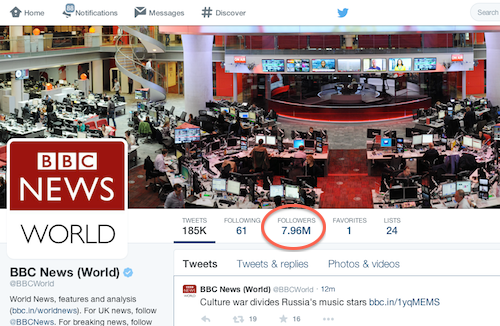BBG Watch Commentary
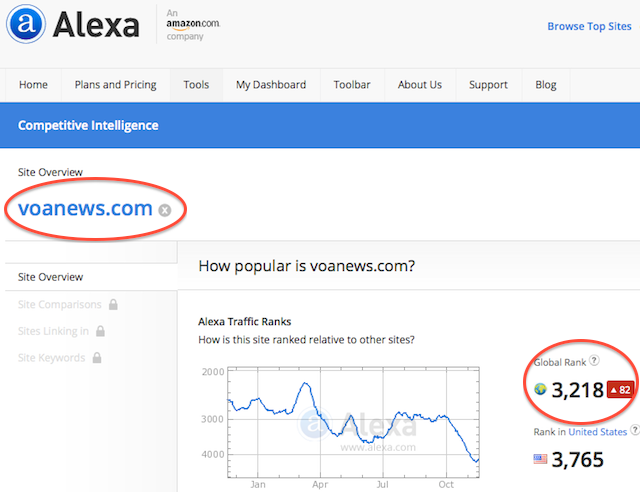
Voice of America Information War Lost: Pants On Fire
By The Federalist
We have been down this road, so many times before. But as long as this remains a card the agency wants to play, we don’t mind giving it an updated treatment.
Consider if you will the latest in the International Broadcasting Bureau (IBB) attempt to put a good face on a very bad situation. The effort is in the form of an article appearing in Radio World (an interesting choice since the IBB hates direct international radio broadcasting) in which the agency claims an audience breakthrough:
http://www.radioworld.com/TabId/64/Default.aspx?ArticleId=273328
Add to this a Broadcasting Board of Governors (BBG) press release:
“U.S. International Media Attract Record Audience of 215 Million,” November 17, 2014.
Wowser.
What attraction? Compared to other real international broadcasters, this claim is pure fantasy. Streaming music programming and no live news coverage by the Voice of America’s (VOA) Worldwide English of the US mid-term elections attracts an audience?
Not likely.
Before we get into the BBG/IBB claims in the article and press release, we should provide a scene-setter for readers.
Here is what is important:
As we will explain later in the piece, we really don’t believe the numbers game the BBG/IBB rolls out periodically. We’re not alone. From Capitol Hill to the State Department, more often than not, Voice of America audience numbers are greeted with skepticism. Reportedly, BBG members have little faith in the content of VOA website, many VOA programs and VOA/IBB claims of VOA’s global audience.
A great deal of skepticism.
Timing Is Everything
Rolling out new audience numbers at this time is no surprise.
First, there is the matter of the VOA’s mid-term elections fiasco. Whatever the time frame of the agency’s audience polling; it has been overtaken by events as represented by this latest debacle. This agency is desperate for good news and publicity, even if it has to manufacture it.
Second, with the change in the political landscape via the US mid-term elections comes the prospect that legislation to reform US Government international broadcasting may resurface. And this could be a “two for the price of one” scenario in which there could be two versions of the reform legislation: the existing US House of Representatives bill (HR 4490) and one crafted in the Senate. With revelations coming out regularly about the continuing implosion of the Voice of America, what could be reported out in the Senate bill might be much tougher on the agency than the House version. The bills would then go to conference to be reconciled as one.
Third, and definitely not least, Andrew Lack, the BBG-designated Chief Executive Officer (CEO) is coming to town in the near future. He will not be Santa Claus at a VOA narcissistic ice cream social. If he is a take charge individual, this could be very bad news for the agency’s self-serving bureaucrats. With Mr. Lack’s wealth of commercial broadcasting expertise, which we presume would include more than a rudimentary understanding of audience research, the entire IBB charade could come crashing down very quickly.
Fourth, the BBG/IBB may be spending up to $50-million dollars in a contract with the Gallup polling organization, spread out over five years at $10-million annually. The IBB doesn’t have much to show for it, which we would presume should attract Mr. Lack’s attention.
Fifth, the agency is lagging light years behind the British Broadcasting Corporation (BBC) which has set its own global audience target of around 550-million on various media platforms. The IBB must feel compelled to show some forward movement toward the BBC projections lest it remain increasingly invisible as an international broadcaster.
The IBB contribution to the agency’s dysfunction could face the prospect of hastening its demise or that of the principal players in the agency’s implosion, particularly if it is examined in detail on this one subject alone, not to mention a host of other issues that make this agency the runaway winner as the worst agency in the Federal Government.
Remember: the primary objective of senior agency officials is self-preservation at all costs. They have destroyed the agency’s mission. That is obvious. With that as part of the record, it’s time to hunker down and undermine Andrew Lack as the agency’s Chief Executive Officer (CEO). There is a lot at stake. They are cornered. If they can undermine any effort to reform of US Government international broadcasting, they survive for at least another fiscal year budget cycle – and add another 2% toward their retirement annuities and perhaps some more bonuses for being dysfunctional and defunct.
The Numbers Game – Again
The First Rule in dealing with agency officials, particularly the hucksters in the IBB:
Never trust. Verify!
Never, ever trust the people who have destroyed US Government international broadcasting. Why would anyone even consider it? A corrupted organization as this agency has become remains so without regard to any name attached to it, any attempt to legitimize its actions or the effort to maintain a façade of mission effectiveness.
One place to start is the audience research numbers game.
It plays out something like this:
It starts with the survey questions.
One thing you have to know about the IBB is that they have no investment in transparency. To date, we have not seen the list of questions that are asked in these surveys or a breakdown of how the responses are grouped.
It’s all in the details, ladies and gentlemen.
For our part, we like being direct.
The very first question we would ask in these surveys would be:
Do you listen to on radio, watch on television or read/watch on the Internet programs of the Voice of America?
Depending on the response, the survey could be very short indeed, as we suspect.
Instead, the IBB is likely to employ diversionary tactics.
For instance, there could be questions about what radio or television stations a person might listen to or watch. The objective here is to identify stations on which the agency has placed program content.
The next objective on the part of the agency is to put out wholesale disinformation: in essence, taking a station’s own survey data and estimated audience and using that as a base line for listeners or viewers of VOA program content on that station.
We know this to be part of the IBB game.
People may pay no attention at all to VOA program content. The program placement may be at dead hours in the station’s broadcast schedule. For example, if the station is 24/7, program managers may bury VOA content outside of morning and evening prime time, in the middle of the night, etc.
The survey may also include a question with regard to a specific local program broadcast by the station. Another IBB tactic is to try to embed program content in specific programs. If the survey respondent answers “yes,” that is not necessarily an affirmative that they watch, listen to or are able to specifically identify VOA program content.
Why?
In part, the answer here is that these stations often have written into their contracts with the agency the unabridged right to decide whether or not to air the VOA program content. This is particularly true of news content, if the content includes reports that may include reports that put the country where the station is located in an unfavorable light. The absolute last thing a foreign station owner wants is to lose his broadcasting license and/or end up in jail. It happens.
Another favorite tactic of these stations is to take a VOA television report, minimize or eliminate the VOA logo and introduce the piece and the reporter as their own – for example, identifying someone as the station’s reporter in Washington, DC. This isn’t rocket science. It is a production technique that has been in place for years. The same applies to radio content where the audio identifying a reporter as a VOA employee can be edited out.
Thus, the best practice in dealing with this agency is trust nothing and question/verify everything. And since the agency is an allegedly global operation, you are talking about a lot of intensive work.
That is what the IBB is counting on – avoiding the commitment of funds and resources for independent verification of the agency’s claims and (the most important part) that the agency’s unverifiable claims are accepted at face value.
That’s another favorite tactic of this agency: make unilateral declarations hoping that they will be accepted as fact. The agency has been playing this game for years. It’s going nowhere. In this day and age, it’s a fools’ game.
In our view, this agency is barely holding its head above water in the audience numbers department. At worst, there is the very real prospect that the numbers, in real terms, are substantially less than the agency claims.
In analyzing the agency on this subject, it is not difficult to reach another conclusion, one in which the converse may be the reality:
the greater the audience numbers the agency claims, the lower those numbers are in reality.In addition, there are other ways to measure the agency’s audience penetration, particularly on the Internet. You can see the number of hits, the number of “likes” and often rather entertaining comments about the quality of the content or some choice vitriol directed at the United States.
So where does that leave us?
We are right where we need to be: confronting an agency that has elevated the bar for dysfunctional and defunct.
Remember this: this agency has been around for over 70 years. Even if true, the number of 215-million divided among 45 VOA languages and the services of the grantee broadcasters like Radio Free Europe/Radio Liberty (RFE/RL), Radio Free Asia (RFA) and others waters down the impact of this number dramatically.
And lest we forget: the global population is 7-BILLION.
And the agency’s programs are effectively blocked in strategic places like China, Iran and Russia.
In the global scheme of things, the agency’s oversized claims remind us of a children’s game:
“Liar, liar, pants on fire.”
The Federalist
November 2014
BBG Watch Commentary

We could not find anyone with even minimal knowledge of international broadcasting and new media who takes seriously the latest audience claims for the Voice of America (VOA), a public media outlet which costs U.S. taxpayers $196.4 million annually (FY13).
Keep in mind that these estimates for VOA were made by the same International Broadcasting Bureau (IBB) / Broadcasting Board of Governors (BBG) officials who had conducted a public opinion poll in Russia-occupied Crimea and announced to the world that nearly everyone there loves Russia’s occupation (they failed to mention Crimean Tatars and ethnic Ukrainians or the fact that polling while the population is traumatized by the invasion, intimidated and afraid to talk to strangers is unlikely to produce valid results).
As our regular commentator, The Federalist, points out, IBB and VOA officials claim as Voice of America audience everybody who stumbles upon any kind of VOA program rebroadcast on a local station, whether that program has any political news or not, or whether it is even identified as a VOA program. These stations are almost always found in countries that have free media or relatively free media. But even in those countries, VOA placement can often be just music or an English lesson.
In many cases, VOA news is specifically excluded from local affiliate placement, especially in countries ruled by less democratic regimes. Those countries get business reports or other program pre-censored by VOA in violation of the VOA Charter.
But VOA management still brags about this kind of placement in its press release, “TV and Digital Fuel Robust Growth for Voice of America,” (Nov. 18, 2014). VOA Director David Ensor said that “VOA’s strategic emphasis on TV and digital platforms drove the overall growth in 2014.” But when it comes to real news, VOA’s digital and social media outreach is an absolute disaster, as clearly seen in reliable third-party statistics which cannot be easily manipulated by Agency officials. For that reason, IBB and VOA officials never cite Alexa, Twitter, Facebook or YouTube numbers — never, ever.
But IBB and VOA officials now appear to claim visitors to VOA websites, not just from other countries, but also from the United States. (IBB and VOA were afraid to do this before the Smith-Mundt Act had been modified by Congress not too long ago, but even now U.S. law does not allow VOA to seek an audience in the United States.) According to Alexa, 21% of visitors to the Voice of America English news website, voanews.com, are in fact from the United States.
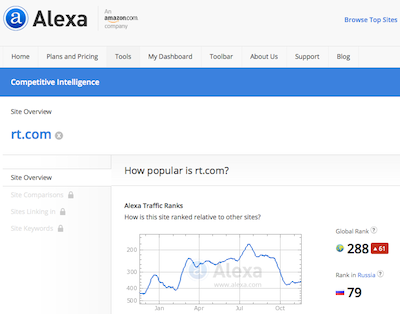
Unfortunately for IBB and VOA officials and their audience claims, real web and social media statistics tell a quite different story.
VOA English News website, voanews.com, is ranked 3,218 globally despite the fact that U.S. taxpayers have been spending nearly $200 million on VOA each year.
Russia’s RT is ranked 288.
Even U.S. State Department website is ranked 1,001, and it is not even a news website.
BBC World News is ranked 66.
Bloomberg is ranked 388.
Even Deutsche Welle (DW) English news website, an international media outlet with less resources than VOA, is ranked 1,236.
Looking at foreign language websites, VOA’s Russian Service website, golos-ameriki.ru, is ranked 27,925
(VOA Russian Service rank declined 1,725 positions versus the last three months).
Radio Free Europe / Radio Liberty (RFE/RL) Russian Service website is ranked 7,083. (RFE/RL is also overseen by BBG.)
Social Media
It looks just as bad for Voice of America on Twitter and Facebook.
Voanews.com (English News) has only 123,000 Twitter Followers.
The U.S. State Department has 1.13 million Twitter Followers.
RT has 807,000 Twitter Followers.
BBC News has 7.96 million Twitter Followers.
VOA Russian Service has only 38,742 Facebook Likes.
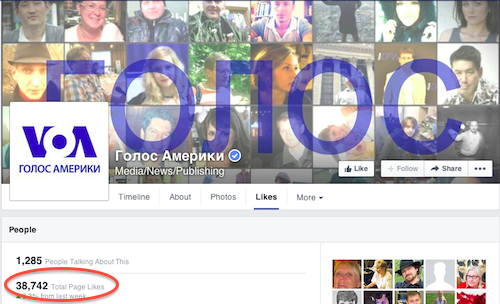
RFE/RL Russian Service has 262,827 Facebook Likes.
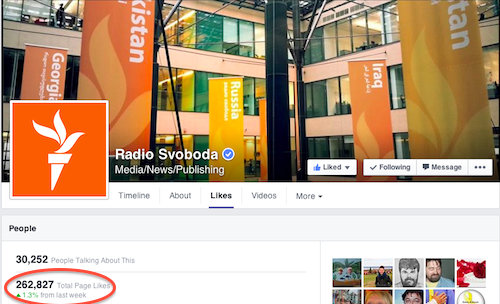
BBC Russian Service has 287,655 Facebook Likes.
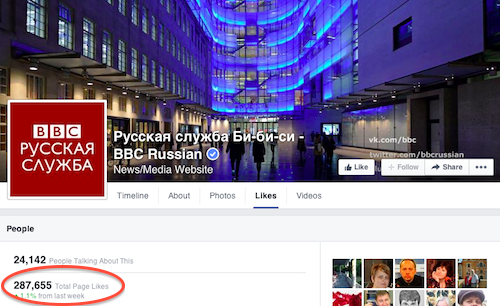
Deutsche Welle (DW) Russian Service Facebook page has 58,007 Likes.

BBC Persian Service has many times more Facebook Likes than VOA Persian Service.
BBC Persian Service has 2,114,787 Facebook Likes.
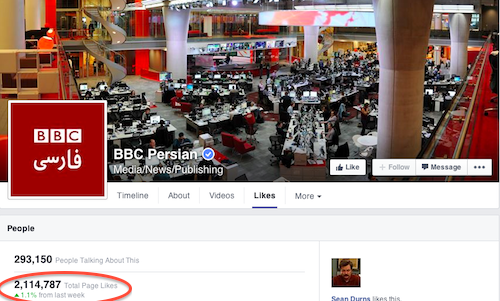
VOA Persian Service has only 321,586 Facebook Likes.
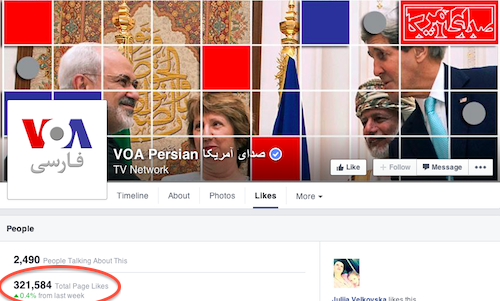
“People Talking About This” on Facebook means “how many people directly interacted with the page in some way in the seven days prior to two days ago.” For BBC Persian Service that number was 293,150. For VOA Persian Service that number was only 2,490. No wonder BBG members and members of Congress do not trust IBB/VOA audience claims in Iran.
Even Deutsche Welle Persian Service has more Facebook Likes and more audience engagement on Facebook than Voice of America Persian Service. We doubt that DW spends as much money on its Persian Service than the BBG spends on VOA’s Persian Service.
Deutsche Welle Persian Service has 586,980 Facebook Likes.
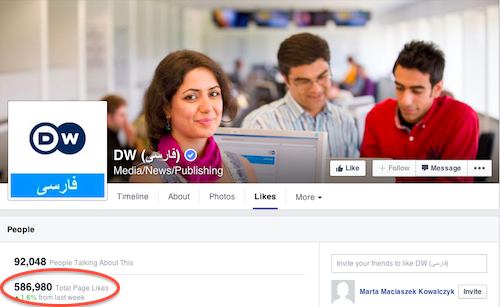
Even Radio Free Europe / Radio Liberty’s radio and Internet focused Radio Farda Persian Service has many more Facebook Likes that VOA’s TV and Internet focused Persian Service.
RFE/RL Radio Farda to Iran has 1,292,442 Facebook Likes compared to 321,586 Facebook Likes for VOA Persian Service.
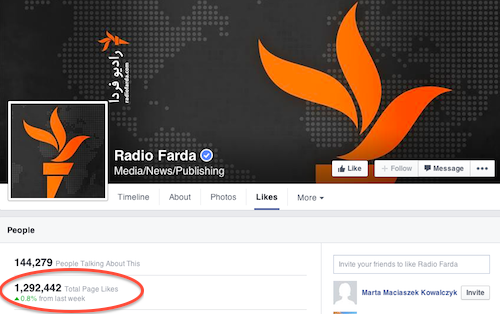
Voice of America is doing just as badly on social media in foreign languages as it does in English. It’s really hard to see what VOA Director David Ensor’s claim about “VOA’s strategic emphasis on TV and digital platforms” means when one looks at solid social media engagement numbers rather than IBB/VOA questionable audience estimates. VOA’s YouTube numbers are even worse, especially when compared to YouTube numbers for Russia’s RT.
Voice of America is also incapable of attracting any significant numbers of web visitors to comment on its news reports and other programs. In many cases, it means that the vast majority of comments on certain VOA news stories, especially those dealing with Russia, are from pro-Kremlin trolls.
A VOA English News report on President Putin being snubbed at the G20 meeting got only 9 (nine) comments from readers, eight of them defending Putin (correct); none critical of Putin.
An RT report about the G20 meeting posted on the same date as the VOA report had 3,172 comments. The same RT report had over 1,700 Facebook Likes. VOA report had only 68 Facebook Likes.
These social media engagement numbers don’t lie and they cannot be manipulated by IBB and VOA officials. (Alexa, Twitter, Facebook, and readers’ comments numbers mentioned in this report were checked on November 18-19-20, 2014.)
As The Federalist also points out, the Voice of America English news website was infrequently updated on the night of U.S. mid-term elections. It showed outdated information long after BBC and other media reported on the Republicans gaining control of the U.S. Senate.
VOA English Twitter and Facebook pages were also not being updated for many hours during the evening of U.S. elections. VOA English radio newscasts on U.S. election night did not have a single news item on the voting or its results and most of the time did not even have any other U.S. news.
Compare and Decide
VOA English News
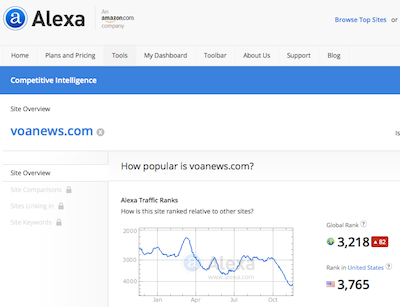
BBC English News
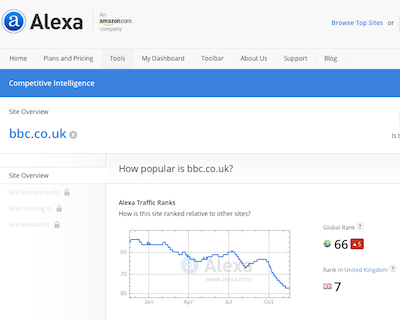
Deutsche Welle (DW) English News

VOA Russian Service Website
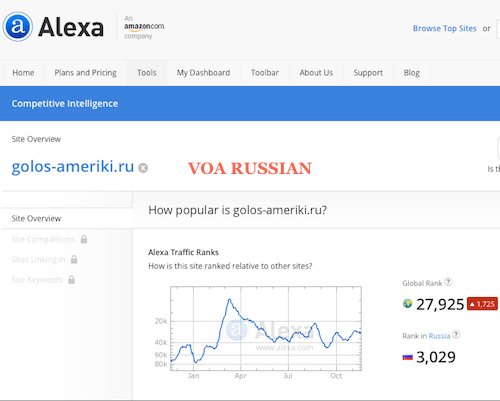
Radio Free Europe / Radio Liberty (RFE/RL) Russian Website

VOA English News Twitter

RT English News Twitter

U.S. State Department Twitter
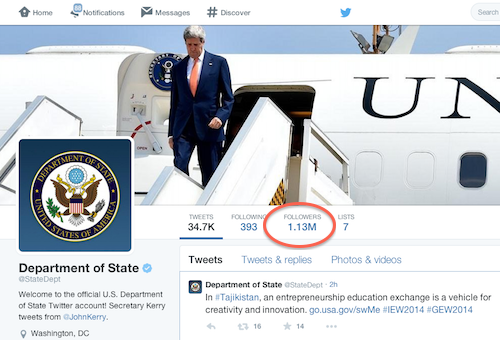
BBC English News Twitter
